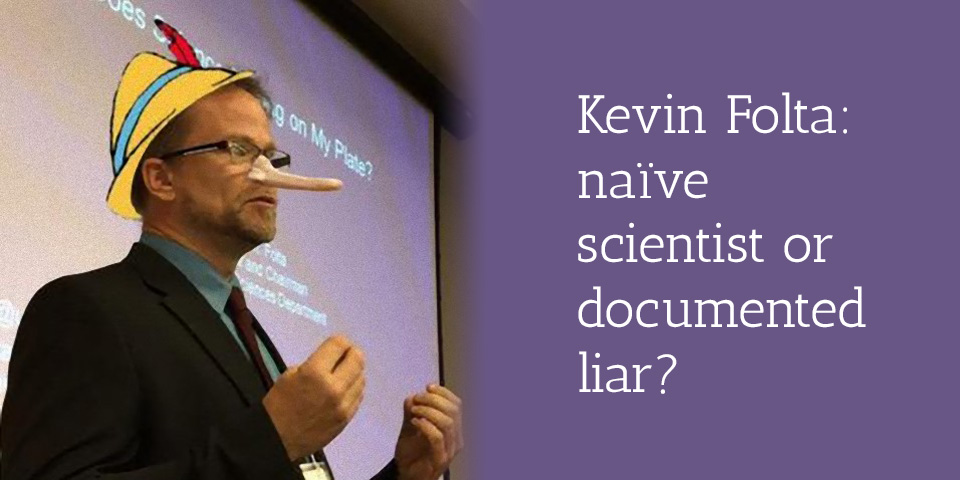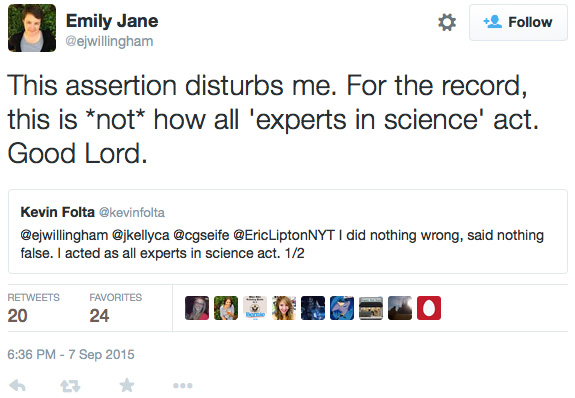
In the second part of this series, Jonathan Matthews examines Kevin Folta’s claims to have done “nothing wrong, said nothing false”
After a recent New York Times article took Kevin Folta’s cosy relationship with the biotech industry mainstream, his would-be apologists sprang into action.
Grist’s Nathanael Johnson, for whose work on GM Folta has been an important source, condensed the whole controversy into a single question: “Are scientists who collaborate with industry tainted?”
But intentionally or otherwise, Johnson’s headline misses the heart of the controversy.
Yes, corporate funding of scientists working at public institutions is a major concern. But what has really stoked the Folta affair is not his close relationship with Monsanto, but the perception that Folta has not been honest about it.
Did Folta lie to the Pennsylvania House of Representatives?
Kevin Folta says he got his $25,000 grant from Monsanto in August 2014. On 6 October 2014 he addressed the Pennsylvania House of Representatives’ Agriculture and Rural Affairs Committee. This was in the run-up to a debate that was scheduled over a bill requiring the mandatory labelling of GM foods – something Folta strongly opposes.
As always, Folta was keen to emphasize to the Committee his credentials as an “independent scientist”, and in particular, his complete independence from the biotech industry. He explained to them how he met all the time with anti-GM activists, adding, “They all ask how much do you get from Monsanto? And the answer is zero.”
The slide that Folta was showing, while he was telling the Pennsylvania legislators he never had a dime from Monsanto, was headed “Outreach program”. And that’s exactly where Folta now says the Monsanto money went. And it went there, don’t forget, two months before he made that declaration in Pennsylvania.
And this was no one-off. Nearly a year after he got the Monsanto money, Folta was still publicly proclaiming: “I have nothing to do with Monsanto.”
Documented liar?
One of the first to accuse Folta of lying was the complex systems scientist Joe Norman. Norman has questioned the honesty of a number of Folta’s statements, including Folta's assertion on Twitter that he was always against the withdrawal of published research by the French scientist Gilles-Eric Séralini that showed toxic effects from GM maize and tiny amounts of Roundup. “I always said it should not have been retracted,” Folta declared.
But Norman points out that prior to making this claim, Folta had actually written to the journal that retracted Séralini’s paper to tell them, “I firmly stand behind the journal’s decision to retract the work.” Later in the same letter, Folta again emphasized his whole-hearted approval of the journal's withdrawal of the paper: “I fully support retraction.” And in case that left any room for doubt, he signed off his letter by saying, “Best wishes and I fully support a journal-initiated retraction”.
One can only assume that Folta later decided it would play better if he posed as one of those who opposed the campaign to suppress the paper – just as it played better for him to appear to have “nothing to do with Monsanto.”
Gaming the system
Some Folta defenders, including his University superiors, still insist that he has done nothing wrong. In a piece for Forbes, David Kroll tells us that after talking to Folta’s boss, Jack Payne, and through him the General Counsel of the University of Florida, he concluded that, “Folta has followed institutional conflict of interest reporting to the letter.”
Nathanael Johnson gives Folta’s take on the controversy: “His real error, he said, was failing to see that public perception mattered.” But emails newly released by the New York Times seem to show something very different – that Folta was all too aware that such perceptions matter and was actively gaming the system.
Among the documents released is Kevin Folta's actual pitch to Monsanto for the $25,000 in funding for his biotech outreach programme. And at the bottom of this (p.104) he outlines exactly how the Monsanto money should be handled in order for it not to qualify as a “conflict of interest”. Doing it in this way, he explains to Monsanto, it is “not publicly noted”.
Kroll’s article quotes Folta’s description of himself as “the naïve scientist” – an innocent who has unexpectedly fallen foul of public perceptions. But Folta’s pitch to Monsanto makes clear he knew that what he was doing with Monsanto's money would avoid it coming to wider public attention – and indeed it probably never would have if it weren’t for the Freedom of Information Act.
Loopholes and semantics
While journalists like David Kroll seem anxious to excuse Kevin Folta’s behaviour, it’s not just the two-time Pulitzer prize-winning reporter Eric Lipton of the New York Times who has raised questions about it.
One of those who has tried to hold Folta to account on social media has been the science writer Emily Jane Willingham. Although Willingham’s own coverage of the GMO issue suggests she is far from sympathetic to the technology’s critics, in Twitter exchanges she has warned Folta that he is now a “poster boy” for the need for greater transparency about conflicts of interest. She describes his attempts to justify his behaviour as “contortions and rationalization” and “absolution by semantics”. She also told him, “You seem to be seeking some kind of loophole for yourself instead of owning the ethics here.” And when Folta asserted, “I did nothing wrong, said nothing false. I acted as all experts in science act”, Willingham responded, “This assertion disturbs me. For the record, this is *not* how all 'experts in science' act. Good Lord.” 
In his tussles with Willingham and others on social media, Folta is invariably supported by a devoted phalanx of followers who proclaim his innocence of all charges and often belligerently challenge his critics. And it is to Folta’s questionable use of social media that we will turn next in this series.










